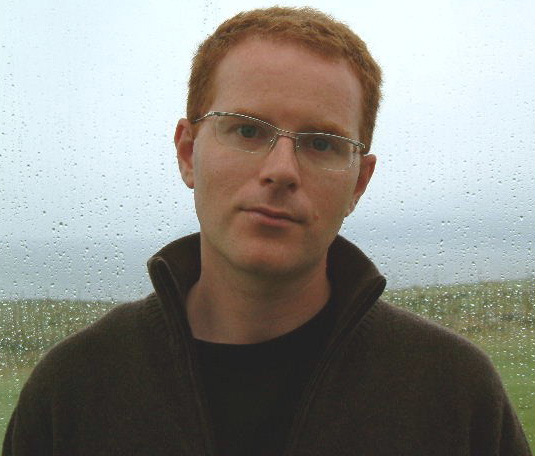Conor McPherson: Unrivaled Storyteller
Conor McPherson has been spinning tales and delighting audiences ever since he was a boy. As a ten-year-old, the future playwright, who was born in Dublin, Ireland in 1971, would invite his friends over to his family's garage and tell them ghost stories he had created himself.
As a teen, McPherson’s life goal was to be a guitarist in a band. His parents, concerned that their son was “completely directionless,” advocated for him to pursue higher education. At University College Dublin, he chose to study both Philosophy and English because, as he jokingly recalls, “I thought they would probably be easy.” His philosophy classes influenced his worldview immensely, teaching him “that what you have to accept is that you don’t know anything, that you’re ignorant, which is a very liberating place to be.” However, it was his English classes that would alter the young man’s career trajectory. “The day I read [David Mamet’s] Glengarry Glen Ross, that was it,” confessed McPherson. “I knew exactly what I was going to do.”
After first trying to write ensemble-driven plays, with Mamet and Arthur Miller as key inspirations, McPherson changed writing tactics and began exploring a form which he would come to master: the monologue play. “I find monologues liberating,” he explains. “I think the freedom they afford is great, just the simplicity of it and the images that people are creating themselves. In three sentences you can convey a whole day. You cut to the chase. You get to the heart of it. People talk about what’s on their minds. I think it’s just that I really love stories. I love it when people talk.”
And people quickly did begin to talk about this tremendous new talent from Dublin. McPherson’s first few monologue plays were produced by Fly By Night Theatre, a Dublin company founded by McPherson and his classmates. This led to an invitation to spend a year in residence with the Bush Theatre in London who, early in 1997, premiered his new work St. Nicholas (a monologue play about a Dublin theatre critic whose infatuation with a young actress drives him to consort with vampires).
A few months later, McPherson would break through in a major way. The Royal Court Theatre commissioned him to write a new play, The Weir, about a group of people in a pub, telling each other ghost stories. The Weir was a more traditional ensemble play than McPherson’s previous work, albeit one in which the characters take turns telling stories. The three week Royal Court engagement was a huge success; the production transferred to the West End in February 1998 for an additional two months of performances and was remounted again that October for another five months. McPherson was awarded a London Evening Standard Award for Most Promising Playwright, and the production successfully transferred to Broadway in March 1999 for another acclaimed run.
Unfortunately, despite all the accolades, McPherson was in trouble. He had been suffering from severe alcohol addiction since 1997. “I was tasting independence and freedom, but I was irresponsible, and probably the wrong person to have it,” recalls McPherson.
“I became dependent on drinking.” His next play, another Royal Court His next play, another Royal Court commission entitled Dublin Carol (2000), was a portrait of a middle-aged Irishman whose drinking problem had undermined all the relationships in his life. At the same time, McPherson’s own 10-year relationship with a dancer that he had met in college was on the rocks. The West End debut in February 2001 of his next work, Port Authority, was overshadowed when he collapsed on opening night and had to be taken to the hospital. His pancreas had burst, and he spent two months in hospital recovering.
Also in 2006, The Seafarer, a new play about an Irishman playing the devil in a game of cards with his soul as the stakes, became McPherson’s most successful work since his breakout with The Weir. Premiering at London’s National Theatre to great acclaim, the production transferred to Broadway the following year and earned McPherson another Tony nomination. The play has gone on to be one of the most produced works in regional theatre over the past few years.McPherson hasn't had a drink since that night, but his recovery stalled any plans for transferring either of his new plays to America. Atlantic Theatre Company in New York eventually produced Dublin Carol in January 2003, but it took until Spring 2008 for Port Authority to cross over. Meanwhile, McPherson made a hugely influential choice about his future writing: he decided to leave behind the monologue form that had launched his career and try something new.
 After turning his life around in just a few short years, McPherson is now widely regarded as one of the most gifted playwrights working today. The Veil, the writer’s first period piece (set in 1822 rural Ireland), premiered at London’s National Theatre in 2011. He has also begun adapting works, creating a stage version of Daphne Du Maurier’s The Birds in 2009 and a tremendous new adaptation of August Strindberg’s The Dance of Death, which premiered at The Donmar Warehouse in December 2012—and which will have its American premiere at Writers Theatre’s Books On Vernon space in the spring of 2014. The Donmar dedicated the summer of 2013 to the Irish playwright, producing the first major revival of The Weir and also premiering McPherson’s newest play, The Night Alive.
After turning his life around in just a few short years, McPherson is now widely regarded as one of the most gifted playwrights working today. The Veil, the writer’s first period piece (set in 1822 rural Ireland), premiered at London’s National Theatre in 2011. He has also begun adapting works, creating a stage version of Daphne Du Maurier’s The Birds in 2009 and a tremendous new adaptation of August Strindberg’s The Dance of Death, which premiered at The Donmar Warehouse in December 2012—and which will have its American premiere at Writers Theatre’s Books On Vernon space in the spring of 2014. The Donmar dedicated the summer of 2013 to the Irish playwright, producing the first major revival of The Weir and also premiering McPherson’s newest play, The Night Alive.
After remarrying in 2003, McPherson and his wife adopted a daughter in 2011. “I’m living as an artist and that’s a staggering feeling, it’s a total luxury,” he says. “And because you have this amazing chance, with so much freedom, I’m determined to make something that is worth that. I feel this responsibility — to create something that makes an audience feel, that takes them somewhere. But that’s very hard to achieve.”
Although it seems that he has left behind the form that launched his career, the playwright remains fond of what he accomplished in his earlier monologue plays, and particularly in Port Authority. “People have always said that the heart of drama is conflict,” he explains. “I find that there’s enough conflict in one person to make a whole play --all those swings, the oscillation in the mind, the self-doubt, the uncertainty, the stupid courage, the terrible feelings of inadequacy -- that’s more than enough. The hardest adversary we will ever face in our life is ourselves.”
by Bobby Kennedy, Producing & Literary Associate at Writers Theatre
© 2024 Writers Theatre



